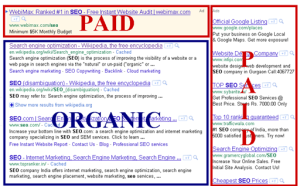I’m going to go out on a limb here and assume you’ve used Google before to search for something. Okay, good, I see you’re nodding. So when you are searching on Google you may have noticed that there are some search results at the top of the page that look a little different than the search results in the middle. You may also have noticed that there are some search results off to the side that look a little different as well. Before going into too much detail about the differences between paid search and organic search, let’s start with some vocabulary.

This should clear up any confusion about which results are organic and which are paid.
Organic Search Results are listings on a search engine results page (SERP) that appear in the middle of the page. Sponsored Search Results are listings on a search engine results page (SERP) that appear at the top or side of the page. So which of these two should you target for your marketing strategy? Let’s take a closer look at each of these options through the lens of a few key areas.
1. Location, Location, Location
The most immediate difference between the two types of search engine results is the location on the page. The “sponsored results” appear on the top or the side of the organic results in a more prominent location on the page. The ordering of the results as well as whether a link is at the top versus the side of the page is based on the amount of money that the campaign has designated for that search term per click as well as how many different campaigns are vying for that position. For more information about Google’s Pay Per Click program click here. The organic results are left to display in the middle of the page under and inside of the sponsored results. The organic results are often referred to as the “regular” listings.
2. Organic Search Traffic versus Paid Search Traffic
At first glance, you might imagine that the sponsored links get all of the click traffic…and you’d be pretty accurate. Although they don’t get all of the traffic they account for 64.6% according to this interesting infographic by WordStream. Interestingly, it has also been discussed that the ads at the tops of the page appear to be spam or untrustworthy to some people and therefore are less likely to be clicked than the side links. Many people, including myself, have become desensitized to advertisements and look beyond them without even realizing it. Still, generally speaking you are more likely to get clicks using paid search versus organic search.
3. Costs Associated
This is where the tide might turn for those of you who are looking to put your money into one versus the other. Pay Per Click, literally costs you each time someone clicks on your link. When you setup your campaign you decide how much you want to invest in each click and based on that amount you will be positioned amongst the other campaigns targeting the same search keywords. Depending on the search engine being used, PPC costs vary. Google uses a formula based on the number of competitors, the specific market, etc to come up with an average cost while Yahoo will allow you to set an exact number for each click. Either way, it is very easy to blow your budget without actually converting any clicks into business.
Organic search results essentially don’t cost you anything and is comparatively labeled “free traffic”. However, as anyone who runs a website knows, there is no “free traffic” and the time investment in optimizing your site to rank for certain keywords is equivalent to dollar signs. One of the best ways to quickly build up your rankings is to find a niche area where you can target your content. It is also extremely important to have a professional looking site that is easy to navigate and full of engaging content. Google’s goal is to bring back the most relevant results for a search query not just the page with the most keywords stuffed into the pages.
4. Should I go with SEO or PPC?
So now, the time is upon us to answer the question: “SEO or PPC?”. It’s not really a simple answer, as I’m sure you could have imagined after reading this article. At first glance, paid results seem pretty great. They will appear right at the top of the page and it seems like there is very little competition. BUT…don’t forget that although you only see a few links in that area…there were many campaigns that were targeting that spot. And, PPC is EXPENSIVE! Believe me. So, organic search SEO tactics right? Not so fast, ranking organically takes time and lots and lots of quality content that is updated frequently (blogging, YouTube videos, social media udpates, etc.).
Something to think about is the net profit from a conversion from one versus the other. If you are using organic search tactics and you convert a sale, you have essentially paid very little for that conversion which gives you a higher net but you won’t get as many. With PPC, you will get more conversions but there will be a cost associated with those conversions where it will take several to offset the cost of those clicks that don’t convert.
In the end, it’s best to go with a hybrid model (it always seems to be the best method right?) where you focus your energy toward your on and off page SEO tactics but also keeping a campaign alive which is using a low cost per click budget and targeting an area where there isn’t a highly competitive market.
